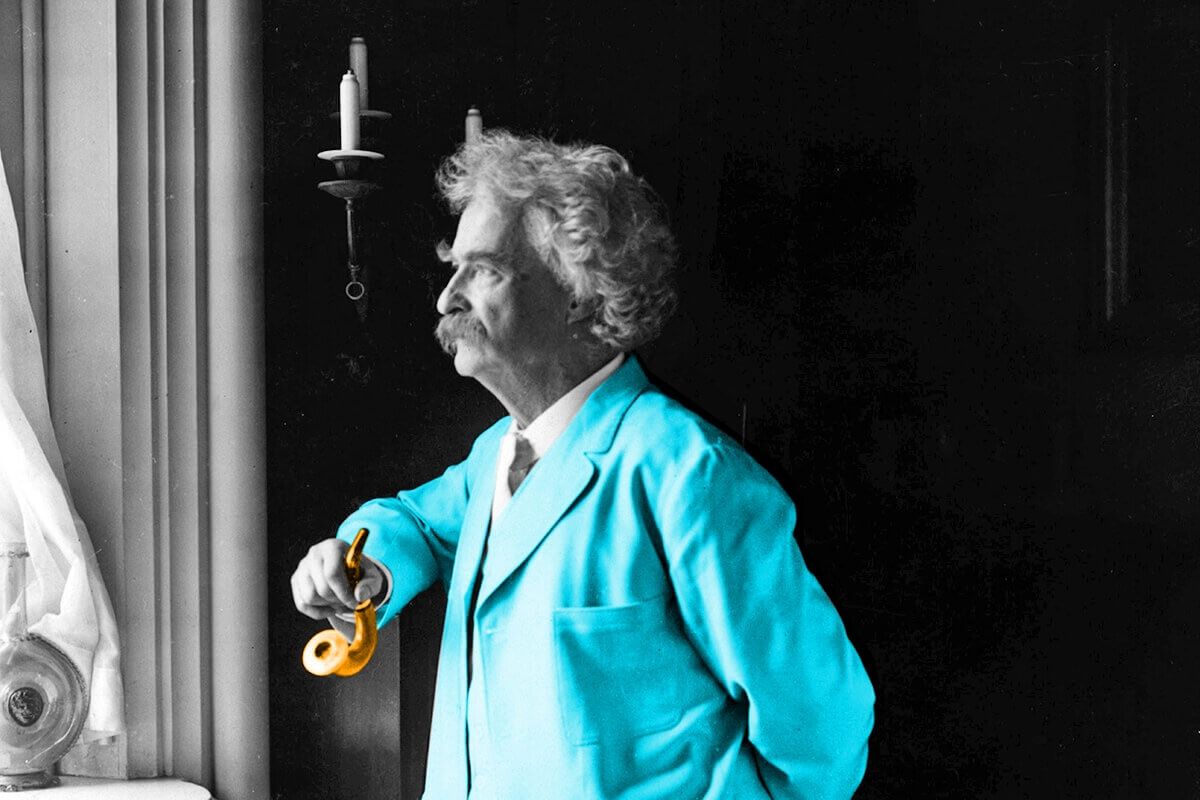

Most writers go by their real name. From Dickens to Dostoevsky, Alcott to Asimov, the lion’s share of all-time greats have published their novels, stories, plays, and poems under true-to-life bylines. But not all of them. Many distinguished men and women of letters have used pseudonyms to accompany their works, and some are so ubiquitous that the public may not even know they’re a pen name. Here are five of the most notable cases and the stories behind them.
Mark Twain

Samuel Langhorne Clemens went by many names. The author and humorist published a number of letters as Thomas Jefferson Snodgrass and a novel about Joan of Arc as Sieur Louis de Conte. There continues to be debate about the meaning behind "Mark Twain," with some even suggesting that it involves his bar tab, but the most widely accepted theory involves the same Mississippi riverboats he made famous in The Adventures of Huckleberry Finn.
The precise etymology relates to the practice of depth sounding. “Twain” is an old way of saying “two,” and the phrase “by the mark twain” means that the mark on the rope suggests a depth of two fathoms. (A “fathom” is a maritime measurement that means six feet, so two fathoms equals 12 feet.) According to Twain — or, rather, Clemens — himself, he wasn't the one who came up with the name: “Mark Twain was the nom de plume of one Captain Isaiah Sellers, who used to write river news over it for the New Orleans Picayune. He died in 1863 and as he could no longer need that signature, I laid violent hands upon it without asking permission of the proprietor's remains. That is the history of the nom de plume I bear.”
Toni Morrison

Not everyone with a pen name is happy about it. Case in point: Toni Morrison, née Chloe Ardelia Wofford. She started going by her saint's name, Anthony, after converting to Catholicism at the age of 12, and the shorter “Toni” caught on soon after. Morrison, meanwhile, was her husband's last name — but she'd already divorced him by the time she began her writing career. According to a 2012 New York Magazine profile, “to this day, she deeply regrets leaving that now world-famous name on her first novel, The Bluest Eye, in 1970.”
“Wasn’t that stupid?” she said. “People who call me Chloe are the people who know me best. Chloe writes the books.” She considered Chloe her true self, while Toni was the acclaimed author and Nobel laureate who did the press tours, the speeches, the “legacy and all of that.”
J.K. Rowling

Even as a muggle, J.K. Rowling has always had a few tricks up her sleeve when it comes to writing under an assumed name. And while it’s true that her real name is Joanne Rowling, the Harry Potter author doesn’t actually have a middle name. She chose J.K. because her publishers, fearful that the apparent target audience for a series about witchcraft and wizardry would be less inclined to read something written by a woman, asked her to use two initials. The “K” in this case stands for Kathleen, the first name of her paternal grandmother.
It doesn’t end there. After the enormous success of Harry Potter, Rowling wanted to try her hand at a different genre. She did so by publishing The Cuckoo’s Calling under the pseudonym Robert Galbraith in 2013, hopeful that her new endeavor could succeed on its own merits rather than ride Harry Potter’s coattails. And though the detective novel was warmly received by critics, it wasn’t until some amateur sleuths uncovered its true authorship that sales skyrocketed. Rowling — who has faced controversy and criticism recently for her transphobic stance — has said that she chose the name in honor of Robert Kennedy, a personal hero of hers, and has written four more books in the series as Galbraith.
George Orwell

Unlike many other pseudonymous writers, George Orwell isn’t especially well known as such. Best known for Nineteen Eighty-Four and Animal Farm, he was born Eric Arthur Blair in 1903 and opted for a pen name prior to the publication of his 1933 memoir Down and Out in Paris and London. It's a powerful account of his time as an impoverished laborer in the two capital cities, and Orwell opted to publish under a pen name out of fear that it would embarrass his family. Several other options were considered: X, P.S. Burton, Kenneth Miles, and H. Lewis Allways. “George Orwell” won out both because he considered it a “good round English name” and because it evoked the River Orwell in England’s Suffolk County, which he lived near at the time and was extremely fond of.
Stephen King

The master of horror has published 61 novels, from Carrie and It to The Shining and Pet Sematary, but only 54 of them are under his real name. The remaining seven are credited to Richard Bachman, King’s longtime nom de plume. Dating back to 1977, when the first of these Bachman works was released, the reasoning was simple: King was too prolific for his publishers. Conventional wisdom at the time, according to the FAQ page on his website, was that "one book a year was all the public would accept" and adopting a pen name "made it possible for me to do two books in one year."
Before settling on Richard Bachman, King was originally partial to a name that "had gotten out on the grapevine" and was therefore unusable: Gus Pillsbury. His pen name is a combination of Richard Stark, one of whose novels King had on his desk while making his decision, and the band Bachman Turner Overdrive, whose song "You Ain't Seen Nothin' Yet" was playing at that same fateful moment.
